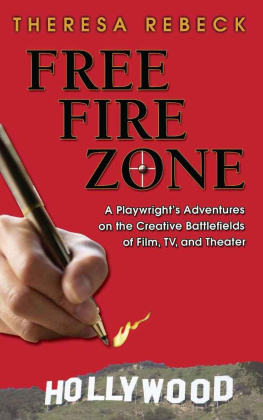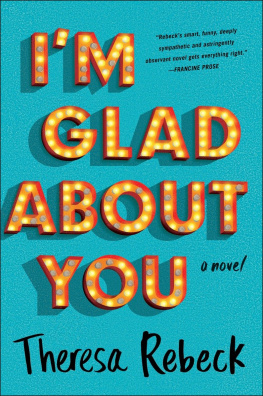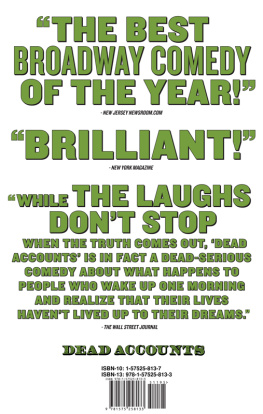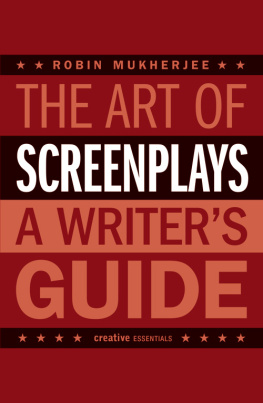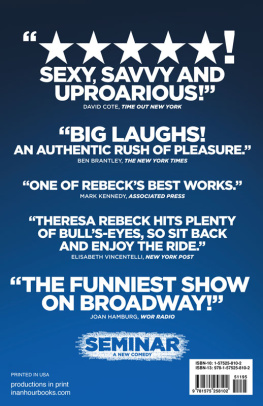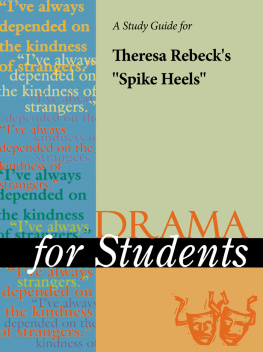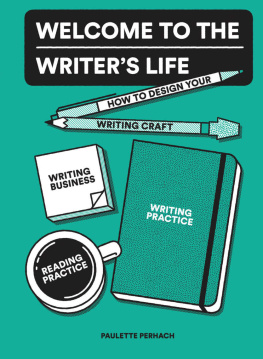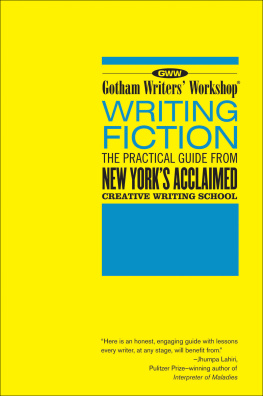T here was a lot to survive in both the living and the writing of these lessons, and I had good people who picked me up and dusted me off more than once. My agents one and all stood by me and wrestled the world on my behalf, beginning with the incomparable and terrifying Esther Sherman, followed by Adam Berkowitz, Peter Franklin, Gary Loder, Cara Stein, Carin Sage, andlast and best Carl Mulert and Tony Etz. Pascal Sauvayre deserves mention for his compassion and steady insight, offered quite consistently through the worst of the storms. Lisa Melamed as ever was a font of lively information about the workings of Hollywood, and Ed Napier provided me with some of the best insights into the life of an artist that I have ever heard; I incorporated their wisdom wherever I could. Kate Snodgrass and Ruth Cohen persistently provided perspective. My two collegial and shrewd assistants, Suzanne Bradbeer and Scott Burkhardt, provided invaluable assistance in the writing and editing of the text. And thanks especially to my husband, Jess Lynn, who lived the whole thing with me and only occasionally lost his sense of humor about it all.
PREFACE
W hen I am asked to speak to young writers, I find that they are deeply curious about the politics of show business. It is a subject worthy of inquiry. Dramatic writing starts with a writer alone, but it never ends there. Eventually, we, and our stories, move out into the world. That is our purpose and our fulfillment. There's no getting around it: If you want to write for the theater, film, or television, you have to face the system.
And the system can be nerve-wracking. One time, someone asked me, What advice would you give to young writers who want to go into show business? I blurted, Tell all of them to go back and reread Machiavelli.
With this book, I hope to address a dramatic writer's challenge: how to tell a story with truth and vision, while simultaneously maneuvering in a very bizarre world.
As I put together these lessons, I found more than enough examples in my own experience to illustrate my points. At times several experiences got collapsed into one, facts got turned around, and all the names got changed. Mostly, my intent was to communicate a sense of a worldwhich, the more I inhabit it, I have to identify as a Free Fire Zone.
Lesson One
Learn How to Write
I have an old friend from high school who has spent the last fifteen years being a doctor. His planand it was always his plan was to be a doctor for fifteen years and then return to his first ambition, which was, and is, to write. When I see him, which isnt often, we talk about Chekhovthe most well-known of the doctorturned-writer set. My friend clings to Chekhov, and Chekhovs journey, like a drowning man on a life raft. Meanwhile, he doesnt write. While his children grow, he fiddles around with this dream on the sidelines of his life, and every three or four years, he and I have a coffee, and we talk about medicine and literature and Chekhov.
With remarkable maturity, during these conversations I refrain from pointing out that if I had spent the past fifteen years being a writer, assuming that then when I got around to it I would suddenly become a doctor, most people would consider me delusional. I dont mention this thought to my friend out of my commitment to good manners, and also because I dont want to depress the guy. Because as he talks it becomes clear that he actually seems to think that if he ever could get around to writing, it would solve everything. My friendwho I like and think well ofhas embraced the two most common misperceptions about writing: Anybody can do it, and when you do it, it makes you happy.
Writing, and being a writer, entails a lot of things, but neither ease nor happiness generally figures into the equation. To be a writer in America at the turn of the twenty-first century is to embrace an odd, ambiguous identity. While the American culture still, to a large extent, romanticizes the act of writing, we do not necessarily celebrate our writers. We celebrate movie stars and politicians and people who make gratuitous amounts of money, but the popular culture does not celebrate writers. Everybody in the country knows Elizabeth Taylor starred in Whos Afraid of Virginia Woolf? but trust me, outside the theater, no one knows (or cares) who wrote it. Simultaneously, as a culture we have learned to fear excellence, so the production entities that control what stories are told in Americathat is, studios, theater producers, network execs, the people making the decisions about what we seeoften go for the lowest common denominator, fearing good writing because its too smart. Consequently, there is an abundance of utter dreck produced on televisionand in the movies and the theater for that matter.
Because of this confluence of collapsed values, many people assume that they can just be a writer, whenever the urge hits them to actually do it. An enormous cottage industry has sprung up to absorb these would-be writers and take their moneyweekend seminars that will teach you how to be a screenwriter in forty-eight hours, or uncredited writers workshops that indoctrinate you in once-a-week classes taught by people with questionable writing credentials. I am actually someone who believes that writing can be taught, or at least that almost anyone with a yearning to write can learn a lot in a serious writing workshop. But I personally find it ridiculous to think you could learn anything significant about any craft in two days, or six hours, from someone whos minimally trained to teach it. A friend of mine assures me that he learned a lot from one of these screenwriting seminars, but he had been writing for years, and mostly what he seems to have taken away was a sense that the teachers quality of hucksterism might be a useful attitude in movieland. If your hope is that any odd detail or flourish, bits of anecdotal gossip, or even a simple understanding of baseline orthographics may be of use to you, then these putative courses may be worth considering. But when I tell you your first task is to learn to write, I mean something quite different.

